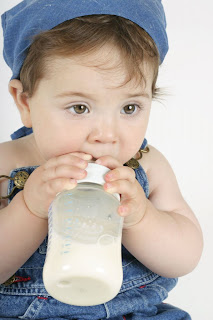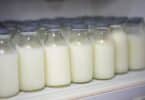 Baby milk manufacturers have been instructed to remove claims that suggest their products are a viable alternative to breastfeeding. Claims such as ‘Closer than ever to breast milk’ and ‘helps growth and the immune system’ are now banned. This applies to popular brands like SMA, Farleys, Cow & Gate, and Aptamil, requiring them to update their packaging and marketing materials.
Baby milk manufacturers have been instructed to remove claims that suggest their products are a viable alternative to breastfeeding. Claims such as ‘Closer than ever to breast milk’ and ‘helps growth and the immune system’ are now banned. This applies to popular brands like SMA, Farleys, Cow & Gate, and Aptamil, requiring them to update their packaging and marketing materials.
The Government’s Food Standards Agency (FSA) has implemented this crackdown on behalf of the national lead body for trading standards officers, LACORS. It is part of the government’s efforts to encourage breastfeeding as the optimal health option for newborns.
Manufacturers who fail to comply with the new rules may face prosecution, while supermarkets have been ordered to refrain from promoting infant formula milk through price reductions.
Les Bailey, a policy expert at LACORS, explained that the Department of Health supports breastfeeding due to its proven health benefits. Breast milk contains beneficial antibodies that are not present in infant formula. Multiple studies have shown the benefits of breastfeeding for brain and body development. In fact, babies who are breastfed for the first three months are five times less likely to experience a gastrointestinal infection compared to those given formula.
Mr. Bailey clarified that claims such as “closer to breast milk,” which are found on infant formula packaging, will no longer be allowed. The aim is to prevent new mothers from being unduly influenced when making feeding decisions.
These new regulations specifically target infant formula, which is designed as an alternative to breast milk for the first four to six months of a baby’s life. While some of the claims may be accurate, concerns about their impact on breastfeeding led to their prohibition.
This ban on nutrition claims is a significant victory for the Baby Milk Action campaign, which has argued that these claims are unlawful under UK and EU regulations introduced in 1995. The FSA and LACORS now agree with this argument and have revised the rules accordingly.
Typical phrases which will no longer be allowed include:
- ‘Now even closer to breast milk’ and ‘Helps to support immunity’, which appears on cartons of ready-made SMA Gold.
- ‘Closer than ever to breast milk’, which appears on Cow & Gate and Farley’s products.
- ‘Supports your baby’s natural immune system’ and ‘The closest to breast milk’, which is seen on packs of Aptamil First.
- Prebiotics support natural defences’.
- ‘Beta carotene… to help maintain a healthy immune system’.
- ‘Nucleotides help growth and the immune system’.
- ‘Omega 3 LCPs – long-chain long-chain polyunsaturated fatty acids – for development’
The campaign coordinator, Mike Brady, expressed appreciation for the supporters who reported instances of company misconduct and participated in the campaign. He views this as an opportunity for action to be taken.
While breastfeeding is actively encouraged by both the Department of Health and the FSA, only 22% of mothers continue to breastfeed their babies at six months, which is a low figure compared to other European countries.
The Department of Health emphasizes that breastfeeding provides the best nutrition and protection against infections and illnesses for babies. The FSA advises new mothers on maintaining a balanced diet and taking vitamin supplements, like vitamin D, to ensure the milk is highly nutritious.
These regulatory changes will reignite the debate on whether mothers should continue breastfeeding or switch to formula, particularly if they are returning to work. With the removal of claims that formula is a good substitute, there will be increased pressure on mothers to breastfeed.
The ban on nutrition claims is just the beginning. Baby Milk Action is calling for similar restrictions to be extended to cover ‘follow-on’ formula for older babies. The group believes that promoting breast milk substitutes should be stopped to protect mothers and ensure they receive accurate and independent information from healthcare providers.
Overall, these recent developments underscore the importance of breastfeeding and the efforts being made to support and encourage it as the best option for the health and development of babies.
I am pleased to see the Department of Health taking a strong stance against baby formula marketing. I hope that North American governments will undertake similar campaigns.
SOURCE






